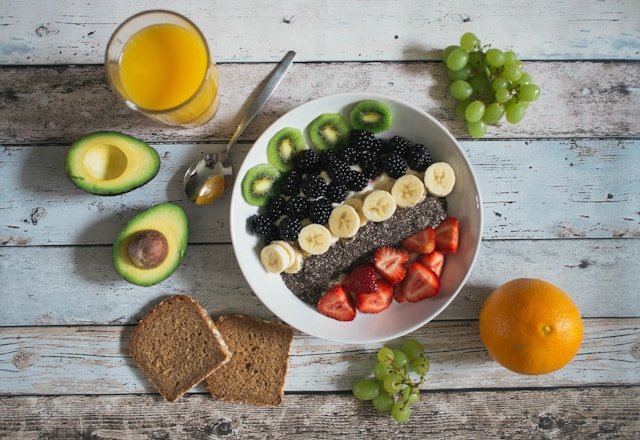
Fiber, often referred to as nature’s broom, plays a crucial role in promoting our health. Despite its importance, many of us are unaware of its full benefits and how to seamlessly integrate it into our daily lives.
Join us as we uncover the secrets of fiber, identify the best sources to add to our meals, and learn how this remarkable nutrient can boost our overall wellbeing in unexpected ways.
Your Nutrition’s Unsung Hero
Fiber, also known as roughage or bulk, is a part of plant foods that our bodies cannot digest or absorb. Unlike other nutrients that are broken down and utilized, fiber travels through our digestive system largely intact.
Soluble vs. Insoluble Fiber
Fiber is like your digestive system’s best ally—it keeps everything running smoothly while providing some surprising health benefits. However, not all fiber serves the same purpose!
There are two primary types of fiber: soluble and insoluble, each with distinct functions in your body. Let’s break it down.
Soluble Fiber – The Gentle Supporter
Soluble fiber dissolves in water, forming a gel-like substance that slows digestion (in a beneficial way!). You can find it in foods such as oats, beans, apples, and citrus fruits.
Here’s how it benefits you:
- Promotes healthy weight – It slows digestion, which helps you feel satisfied for longer, aiding in weight management.
- Reduces cholesterol – It captures some of the cholesterol you consume, preventing its absorption into your bloodstream.
- Regulates blood sugar – Because it slows digestion, it also moderates carbohydrate absorption, leading to more stable blood sugar levels.
- Enhances heart health – By lowering cholesterol and stabilizing blood sugar, it can help minimize the risk of heart disease.
- Nourishes gut bacteria – Some soluble fiber acts as food for your beneficial gut bacteria, supporting their health and function.
Insoluble Fiber – The Bulk Builder
Insoluble fiber doesn’t dissolve in water; instead, it adds bulk to your stool and aids in moving things through your digestive system. You can find plenty of it in whole grains, bran, nuts, and vegetables like cauliflower and potatoes.
Here’s why it’s important:
- Helps prevent constipation – It adds bulk to stool and draws in water, facilitating smoother passage through the intestines.
- Lowers digestive issue risks – It helps prevent conditions like diverticular disease and hemorrhoids.
- Provides zero extra calories – Since your body doesn’t break it down, it fills you up without adding calories.
Balance is Essential
Both types of fiber are vital, and a good mix of the two ensures your digestive system operates optimally while promoting heart health, weight management, and overall wellness.
So, stock up on fiber-rich foods—your body will appreciate it!
Crafting Your Daily Fiber Routine
Creating a daily fiber routine doesn’t have to be overwhelming; simple, small adjustments can lead to significant health improvements. Begin your day with a fiber-rich breakfast like oatmeal topped with fruits or a whole-grain cereal. Incorporate legumes, whole grains, and a variety of vegetables into your meals. Snacking on fruits, nuts, or seeds can further enhance your fiber intake.
Remember to gradually increase your fiber consumption to avoid digestive discomfort and to drink plenty of water to help fiber work effectively.
When Food Isn’t Enough, Rely on Fiber
Although we may strive to meet daily fiber recommendations through diet alone, it can be challenging, especially with the rise of processed foods and busy lifestyles. This is where fiber supplements can be beneficial. Supplements like psyllium husk can help fill in dietary gaps, especially for those who have higher fiber needs or dietary restrictions. These supplements are generally safe for daily use, but your body will need time to adjust.
Gradually increasing your intake—and drinking plenty of water—can alleviate digestive discomfort and allow fiber to function properly.
If you’re taking medications, it’s advisable to separate your supplement intake from your meds by at least two hours, as fiber may affect absorption. Supplements typically come in powder, pill, or gummy forms.
As always, consult a healthcare professional before starting any new supplement to ensure it aligns with your health needs.
Addressing America’s Fiber Shortfall
Despite FDA recommendations of 25 grams of fiber per day for women and 38 grams for men, only about 5% of Americans meet these guidelines.
This shortfall, often referred to as the “fiber gap,” results from the prevalence of processed foods and a scarcity of whole, plant-based foods in the typical American diet.
Closing this gap requires intentional dietary choices, such as choosing whole grains over refined ones, increasing the variety of fruits and vegetables in meals, and considering fiber supplementation when necessary.
*Disclaimer: If you have any existing health issues or take medications, please consult with a healthcare provider before using psyllium.







